
FREE SPEECH AND THE SUPPRESSION OF DISSENT DURING WORLD WAR I
Free Speech and the Suppression of Dissent during World War I
Eric T. Chester

Copyright 2020 by Eric T. Chester
All Rights Reserved
Library of Congress Cataloging-in-Publication Data
available from the publisher.
ISBN paper: 978-1-58367-868-8
ISBN cloth: 978-1-58367-869-5
Typeset in Minion Pro
MONTHLY REVIEW PRESS, NEW YORK
monthlyreview.org
5 4 3 2 1
Contents
Acknowledgments
Most of the research upon which this book is based was done at the National Archives in College Park, Maryland. The National Archives holds a vast amount of archival documents and I would like to thank the archivists in College Park for their help in locating relevant documents. I went to other archives in both the United States and England. The archivists at these libraries were of great assistance.
I would also like to thank Susan Dorazio, my partner, for her support and encouragement during the long period between the initial conception of this project and its fruition in a published book.
Freedom is always for those who think differently.
ROSA LUXEMBURG
 1
1 
Introduction
The era since the terrorist attack on the Twin Towers on September 11, 2001, has been marked by the continuing erosion of fundamental rights. Successive administrations have defended this unceasing attack on the Bill of Rights with the claim that civil liberties need to be balanced against security concerns and thus, in a time when further terrorist attacks are a genuine threat, individuals have to give up some of their basic rights for the good of the entire society.
This concept that fundamental freedoms are not absolute rights but must be balanced against security concerns has become dogma. It is often taken to be self-evident, but the reality is that it is one of several theories concerning free speech that have been advocated over the years. Furthermore, it first arose out of the specific circumstances of the First World War and the draconian measures that the federal government imposed on those who dared to oppose the war effort.
The First World War was a catastrophic event that had a tremendous impact throughout the world. In the United States, President Woodrow Wilsons decision to lead the country into the war was intensely unpopular. As opposition to the war increased, the government responded by initiating a coordinated effort to silence any expression of a dissenting viewpoint. This effort could only be implemented through a drastic erosion of fundamental civil liberties. The legal battles that ensued continue to resonate even now, a century later.
Although Wilson adamantly insisted that his policies had the support of the vast majority of the American people, and that those who dissented from the administration constituted a small and insignificant minority, most observers understood that opposition to the war was widely held and deeply felt. Dissidents were convinced that their views represented the majority opinion. In private, supporters of the administration assessed public opinion in similar terms.
It was in this context that the Wilson administration was spurred to propose repressive legislation intended to suppress any organized opposition to the war effort or to the draft. In crafting its program of repression, the Wilson administration relied heavily on the wartime experience of Britain. The government of the United Kingdom (UK) adopted an intricate web of rules and regulations that stifled dissent and curbed walkouts at the workplace.
As the war continued, and became even more unpopular, the U.S. government widened the range of those subject to repression. Increasingly, progressives who dared to question official war policies found themselves marginalized and reviled as traitors.
Many of these progressives were influential figures who had played a prominent role in mainstream politics. The governments decision to target them inspired a broad movement to defend civil liberties. As a result, the defense of free speech became a major focus for many of those on the Left. Even some of those who endorsed the administrations decision to enter the war found themselves opposing the draconian measures taken to repress dissent.
This clash, between a government intent on suppressing all dissent and an anti-war opposition with strong roots in popular opinion, lies at the heart of this book. The question of the extent to which the First Amendment of the Bill of Rights protected those who dissented from the governments policies was widely debated. Different and conflicting theories were formulated and contrasted. The federal government defended its decision to crush the opposition as a necessary price to pay during wartime. Indeed, the president was convinced that the decision to enter the war had created a crisis situation in which fundamental rights could be disregarded. He therefore gave government agencies a wide scope for action, even though the result was a trampling of basic rights and the creation of a society where anyone who even thought of presenting a dissenting view lived in fear.
During the First World War, the federal government launched a sustained attack on its opponents that remains without equal to this day. Woodrow Wilson was prepared to use virtually every possible method to disrupt the opposition. The post office refused to mail antiwar journals or leaflets. Soldiers were used to suppress strikes and indefinitely detain activists. Military intelligence conducted intensive surveillance of civilian antiwar activities. Of course, the Justice Department was the primary agency used in this campaign of repression. Prosecutors took advantage of the nebulous wording found in the Espionage Act of June 1917 to bring charges against those who argued that the United States should open peace talks with Germany. Those convicted often served lengthy sentences in the harsh conditions of a high-security prison.
At the same time as it openly implemented a coordinated series of repressive actions, the federal government engaged in a series of covert operations to demoralize and divide the opposition. This book discusses two of these operations, the effort to pressure Eugene Victor Debs into supporting the war and the illegal surveillance and harassment of the National Civil Liberties Bureau, the predecessor of the American Civil Liberties Union.
The governments flagrant campaign of repression could only occur with the approval of the judicial system. Most judges, at every level from district courts to the U.S. Supreme Court, wholeheartedly supported the war effort and were willing to leave the decision as to the limits of dissent to the discretion of the president and the Justice Department. Even the clear and present danger doctrine, which Justice Oliver Wendell Holmes Jr. first formulated in a case arising from wartime dissent, granted the Justice Department a wide scope in determining who to prosecute.
Both the clear and present danger doctrine and the doctrine of the balancing of conflicting interests developed out of the historical context set by the First World War. Those who propounded these theories, Oliver Wendell Holmes Jr., Justice Louis Brandeis, and Zechariah Chafee, viewed themselves as centrists, seeking to find a reasonable alternative to extremists on both sides. They were uneasy with the administrations eagerness to harshly suppress all dissent, even that coming from mainstream progressives, but they also disagreed with radicals such as Eugene Debs who argued that the right to free speech held without restriction even during wartime. Instead, the Holmes-Chafee school argued that, although free speech was an important right, it could be significantly circumscribed in certain circumstances such as wartime.
Next page
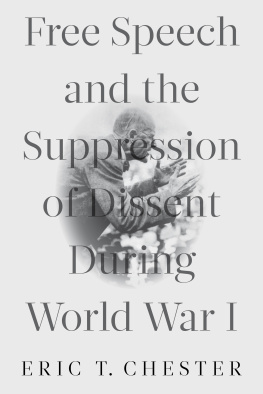
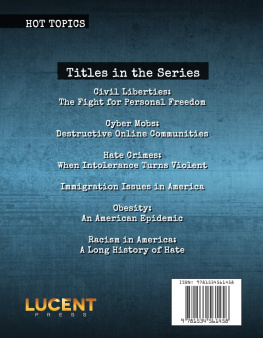
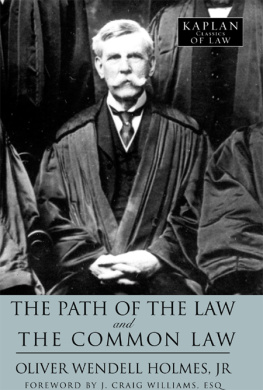

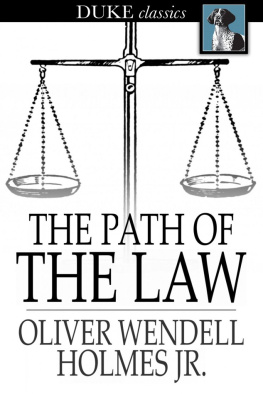
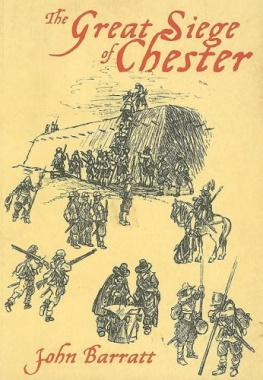


 1
1